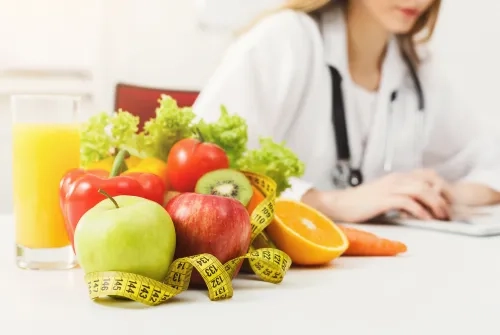Alo Yeditepe
Alo Yeditepe
Emotional Eating May Be the Cause of Your Weight Gain
Tips to Help You Lose Weight in Ramadan
In recent years, fasting in the month of Ramadan has been around 16 hours. However, some complain that they are gaining weight. Merve Öz, who is the only doctor in Turkey with both the title of Specialist Clinical Psychologist and Specialist Dietitian, states that this situation pushes people to overeat beyond physical hunger for fear of starvation. However, she also underlines that wrong choices such as eating fast food and choosing calorie foods are effective in gaining weight.
Stating that it is not a rule to gain weight in Ramadan, it is even possible to lose weight by paying attention to a few points, Yeditepe University Koşuyolu Hospital Specialist Dietician Merve Öz also added the following: “As a general rule, we can say that if the calories you take are less than the calories you spend, you can lose weight. In this case, there are three important points to lose weight: eating a healthy and regular diet, increasing physical activity, and drinking enough water.” Merve ÖZ lists the things to be considered as follows…
Do Not Skip the Sahur
One of the most important factors in weight gain is slowing metabolism... During Ramadan, the body goes hungry for a long time. This causes muscle destruction as well as slows down the metabolism. You need to eat as much as possible to speed up your metabolism. In Ramadan, it is useful to eat at least 3 meals, including iftar, after iftar, and sahur. If you are not worried about insomnia, white tea or green tea can be consumed between iftar and sahur to speed up your metabolism.
Eat Mild Foods in Sahur
In the Sahur, one can eat a lot with the fear of being hungry all day. The important thing is not to eat too much, but to eat quality food. Spc. and Dietician Merve Öz listed her suggestions for a healthy sahur meal as follows: “Do not consume pastries and fries in sahur. Instead, breakfast and soup may be a good choice. For breakfast; jam, chocolate, honey, molasses, and white cheese instead of fatty cheeses, tomatoes, cucumbers, greens, and olives should be consumed without exaggerating the amount. Eggs should be preferred both because they are a very good source of protein and because of their satiety properties.
Do Not Eat Main Meal First in Iftar
After eating your soup, you should take a break for 15 minutes and then eat the main meal. The saturation signal to our brain goes off in 20 minutes. For this reason, taking a break before a meal in iftar facilitates portion control as well as providing slow food. In addition, starting with a bowl of soup prevents the feeling of satiety and a sudden increase in blood sugar.
Have a Salad With Your Main Meal
The salad will fill the stomach volume, preventing you from eating more calorie-rich foods. Additionally, the fiber you will take from the salad will help you lose weight as it will relieve your bowel laziness. Make sure to add 1 teaspoon of oil to your salad. Because it will be possible to get fat-soluble vitamins by adding oil to your salad. But don does not add more oil and sauce to your salad.
Consume Whole Wheat, Einkorn, or Whole Grain Bread Instead of Ramadan Pita
Yeditepe University Koşuyolu Hospital Nutrition and Dietetics Specialist Merve Öz: ''Pita causes a sudden increase in blood sugar. Unfortunately, limits can also be exceeded due to the hot pita flavor in iftar. In this case, it causes unnecessary carbohydrate consumption. Bread, which is the highest quality carbohydrate, should be consumed instead of pita. But the bread you will consume should be whole wheat, einkorn, whole grain, and rye bread. If there is no anemia problem, whole-wheat bread can also be consumed.”
Consume Bread or Bulgur Rice Instead of Rice, Pasta, and Potatoes
Since the highest quality carbohydrate is bread, my first suggestion will be bread instead of rice, pasta, and bulgur rice. Because quality bread such as whole wheat bread will both increase saturation and not cause sudden increases in blood sugar. My second suggestion is that if you are going to eat rice, pasta, and bulgur rice, you should choose bulgur rice. You can count 3 tablespoons of rice, pasta, and bulgur rice instead of 1 slice of bread.
Meet Your Sweet Needs With Fruits
The most important reasons for gaining weight in the month of Ramadan are sweetness. One slice of baklava is 260 calories, while 1 serving of fruit is 60 calories. Therefore, instead of consuming calories from dessert, consume fruits with vitamins and minerals. If you are going to consume dessert; consume milk dessert or ice cream instead of syrup ones.
Take the fruit 2 hours apart as a snack. Instead of fruits such as watermelons, melons, and bananas with a high glycemic index, you can consume fruits such as apples, pears, strawberries, and plums with a low glycemic index.
Consume Milk, Yogurt, and Kephir for Your Protein Needs
Muscle wasting occurs when protein is consumed inadequately. Therefore, it is important to meet protein needs. You can consume milk and dairy products in iftar, sahur, or as a snack. You can make a great snack by adding 8-10 strawberries and 1 teaspoon of honey to 1 cup of milk and seasonal fruits. You can also consume the prepared strawberry milk instead of dessert.
Pay Attention to Intestinal Laziness
Going to the bathroom regularly and keeping your bowels clean is a very important factor for your body's health. Stating that fibrous foods should be consumed for intestinal laziness, Specialist and Dietician Merve Öz: “At this point, the salad you will consume in sahur and iftar is important. The artichoke, which is a source of insulin, will relax your intestines a lot.”. Reminding that it will be beneficial to include kephir in the sahur, Dietician Merve Öz lists her other suggestions as follows: “Dried apricots, prunes, dried figs, and pears are among the fruits that relax your intestines. If you have been experiencing bowel laziness for a long time, throw 3 apricots into warm water at night before going to bed. When you wake up, you can drink the water and eat the apricots. Since dried apricot is a fruit with a high glycemic index, diabetics should apply this recipe carefully.”
Break Your Fasting With Water
Adequate water consumption is also one of the most important aids in weight loss, as it increases the speed of metabolism and reduces appetite. A glass of warm water will also help you eat less, as it will increase the feeling of fullness. Reminding that the amount of water to be taken daily can be found by multiplying the person's weight by 30 ml, Dietician Merve Öz: “After calculating the amount of water you need to take daily, be careful to consume this amount between iftar and sahur.
Beware of Your Emotional Eating
Stating that Ramadan month is the best time to notice emotional eating, Merve Öz also added: “If you suddenly think of eating foods such as chocolate and biscuits instead of foods that will satisfy your hunger, this situation is due to emotional eating. In fact, this method is used unwittingly to temporarily relieve the stress or negative emotion you are experiencing at the moment. If you have noticed emotional eating in yourself in this way, you should take precautions.
In order to satisfy emotional hunger, one should find other pursuits instead of engaging oneself in eating. Dietician Merve Öz continued her words as follows: “Walking, drinking coffee, reading books, listening to music, and dancing may be among these activities. It will also be effective to change the environment and do breathing exercises. If you try them and do not succeed, Cognitive Behavioral Therapy and a Healthy and Permanent Slimming Program will help you.”
Press Coverage: sabah.com | dha.com | ntv.com | cnnturk.com | mynet.com
About
Faculty and Year of Graduation:
Yeditepe University Faculty of Arts and Sciences, Department of Psychology and Faculty of Health Sciences, Department of Nutrition and Dietetics, 2016
”
See Also
- What is Vitamin A? What are the benefits of Vitamin A?
- What is Selenium? What Does It Do? What are the Benefits?
- Does the Sweltering Heat Affect Our Mental Health?
- What is Vitamin E?
- What is Coenzyme Q₁₀? What are the Benefits of Coenzyme Q₁₀?
- What is Vitamin B12? What are the Symptoms of B12 Deficiency?
- What is Mythomania (Pathological Lying Disorder)? What Causes Mythomania?
- What is Emotional Hunger? How Does It Arise?
- Benefits of Spices
- What Does Narcissist Mean? Narcissistic Personality Disorder
- At What Age Should Children Start Using Social Media?
- What is the Ideal Age for Marriage?
- Special Nutrition Recommendations for the Eid
- The True Face of the Protein Myth
- What Are the Benefits of Beets?
- Suggestions to Get Rid of the Menopause Belly
- "Is the Watermelon Diet Healthy?
- Ways to Boost Mental Resilience
- Frequently Asked Questions about Detox
- Boost Your Immunity Naturally
- Which Foods Should be Consumed Together?
- How Do You Approach a Child Who Is Reluctant to Go to School?
- Stop Blaming Yourself
- The Concern of Being a ‘’Good Mother’’ in Pregnancy
- It is Possible to Lose Weight by Dominating Your Brain
- Mom, Can I Sleep With You?
- 9 Points to Be Considered for a Healthy Ramadan Month!
- The Healthiest Summer Fruits
- Shining Star of the Tables: Probiotics
- The Problem may be the Lack of Self-Confidence!
- Ways to Deal with Quarantine Weight
- Burnout Syndrome at Work Gains Weight
- Children Should Be Away From Fast Food Toy
- Children's Eating While Studying Prepares the Ground for Obesity
- Permeable Bowel Syndrome Can Prepare the Ground for Diseases
- Suggestions to Prevent Children from Gaining Weight While Still
- 8 Suggestions to Keep the Immune System Strong in Ramadan
- 8 Suggestions for Kids with Focus Problems
- It is also Possible to Lose Weight During the Holidays!
- Immune Enhancing Nutrients
- Is Co-Sleeping With the Child Right?
- Healthy New Year's Eve Table Suggestions
- Do not take unneeded calories to your body
- Suggestions to Increase Metabolic Rate…
- Nutrition Recommendations Before the Exam
- How to Feed Children in Summer?
- Is There a Nutritional Difference Between Sports to Increase BMI and Sports to Lose Weight?
- What Should You Do to Avoid Gaining Weight for the Holidays? Do Not Be a Victim of the Buffet
- Cancer and Nutrition
- Nutrition and Diet
- Healthy Diet
- Elderly Care
- Alkaline Nutrition
- 9 Tips to Prevent You from Gaining Weight While at Home
- 9 Suggestions to Fix Childrens Deteriorated Eating Habits
- Fibromyalgia May Be the Cause of Persistent Pain
- What to do from Iftar to Sahur for a Healthy Ramadan
Alo Yeditepe




